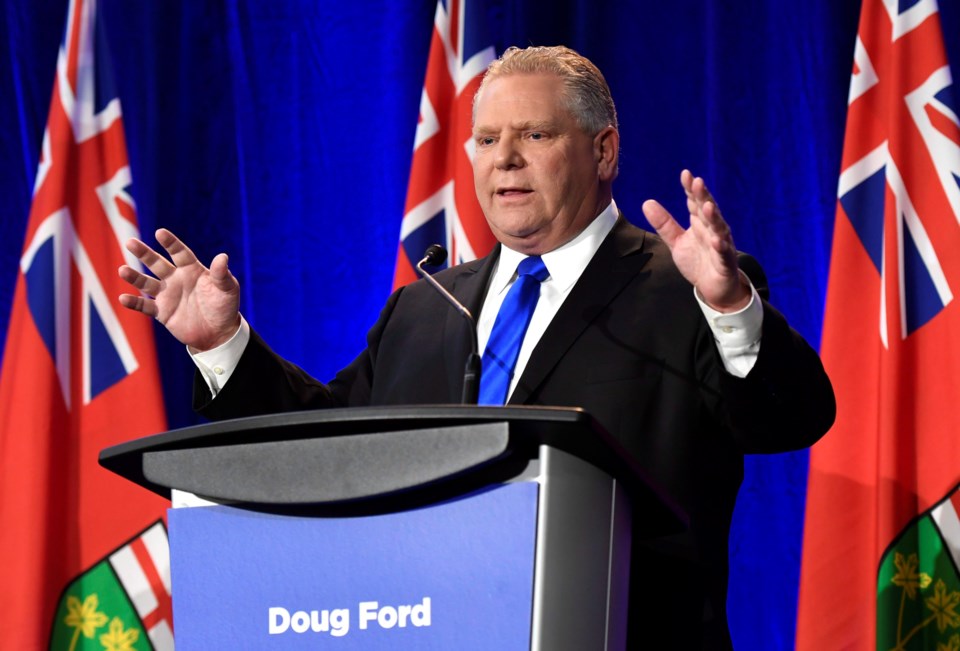The impact of a remarkable 30 days – the consequences from the sudden and scandalous fall, surprising comeback and relapse of Patrick Brown – may have altered Ontario’s political landscape forever.
But the sequence of events is so strange and so unprecedented, even the experts are at a loss to gauge what the impact might be on Ontario’s Progressive Conservatives and the outcome of June’s provincial election.
“Unusual would be an understatement,” mused Michael Johns, an associate professor of political science at Laurentian University in Barrie. “It’s not something any of us have seen, so there’s not a parallel in which to draw from.”
Despite the civil war that has ravaged the once-powerful political party associated with Bill Davis and Mike Harris, the province’s reigning Liberals are so reviled, Johns believes the Tories could still wrest power from Kathleen Wynne.
“I think they have a very good chance of winning,” said Johns. “All the polling shows a large group of Ontarians simply want a different government. We’ve seen that poll before with the Conservatives not coming out on the winning end … but, no matter who is leading, they have a good chance.”
Johns said it’s impossible to predict who, ultimately, will win the leadership contest called to replace the deposed Brown. He said each of the candidates – Doug Ford, Carolyn Mulroney, Christine Elliott and Tanya Granic Allen – have constituencies that represent points along the entire conservative spectrum. He believes the “least objectionable” candidate will likely be the one to be named the winner on Saturday.
Regardless of the outcome, the PCs, said Johns, are a divided party that includes farmers, social conservative, business people interested in taxes and the economy and “then you have this other group that has been brought into the party recently who haven’t been traditionally part of the PCs, which are a lot of new Ontarians.”
Johns said Brown “tried to take the party in a certain direction and received enormous backlash.” With the leadership contestants spanning the Conservative spectrum, Johns said it has voters wondering: “What does it meant to be a PC in Ontario? It’s hard to see how all these wounds that have opened up, how they might heal – especially with less than 100 days to an election.”
And that’s why, whoever replaces Brown at the helm will face a daunting task.
“Winning an election and forming a cohesive government are two very different things,” said Johns. “Now, at this particular moment, they don’t have a platform. Don’t forget, most of the candidates running were recruited by Patrick Brown and were supporters of his People’s Guarantee. The new leader has to get them on side, come up with a plan and get it out there … and they don’t have a lot of time to do that.”
The chaos within the party and widespread unhappiness with the Wynne Liberals could provide a perfect storm of sorts for the NDP, Johns predicted, comparing it to a similar scenario in 1990 that saw Bob Rae come to power.
“They do have a very small window and the only time they have won in Ontario, it was a similar set of events,” said Johns, noting it was a time when voters were unhappy with the Liberals and “very unhappy” with the Conservatives. “That perfect storm may be coming again.”
Johns said NDP leader Andrea Horwath must act quickly, however. “If you ask the average Ontarian which leader do you respect most – she wins,” noted Johns. “But then you ask who will you vote for and the NDP is always second or third depending on the poll. That seems to indicate people still have reservations about the party.”
He said Horwath needs to step up her game, release the party’s platform and take advantage of the angst voters have. “If you’re unhappy with the way the Conservatives have conducted themselves over the last month and you’re unhappy with 15 years of Liberal rule, the NDP and Green party are your only options,” he said.
Johns said as soon as the PCs announce their new leader, Horwath should strike. “The window is open but they have to go through it. They have to say, ‘here’s what we would do, here’s how it would work, here’s what it would cost.’ They have to show they can govern,” said Johns. “They have to stand for something. Being least objectionable isn’t enough.”
